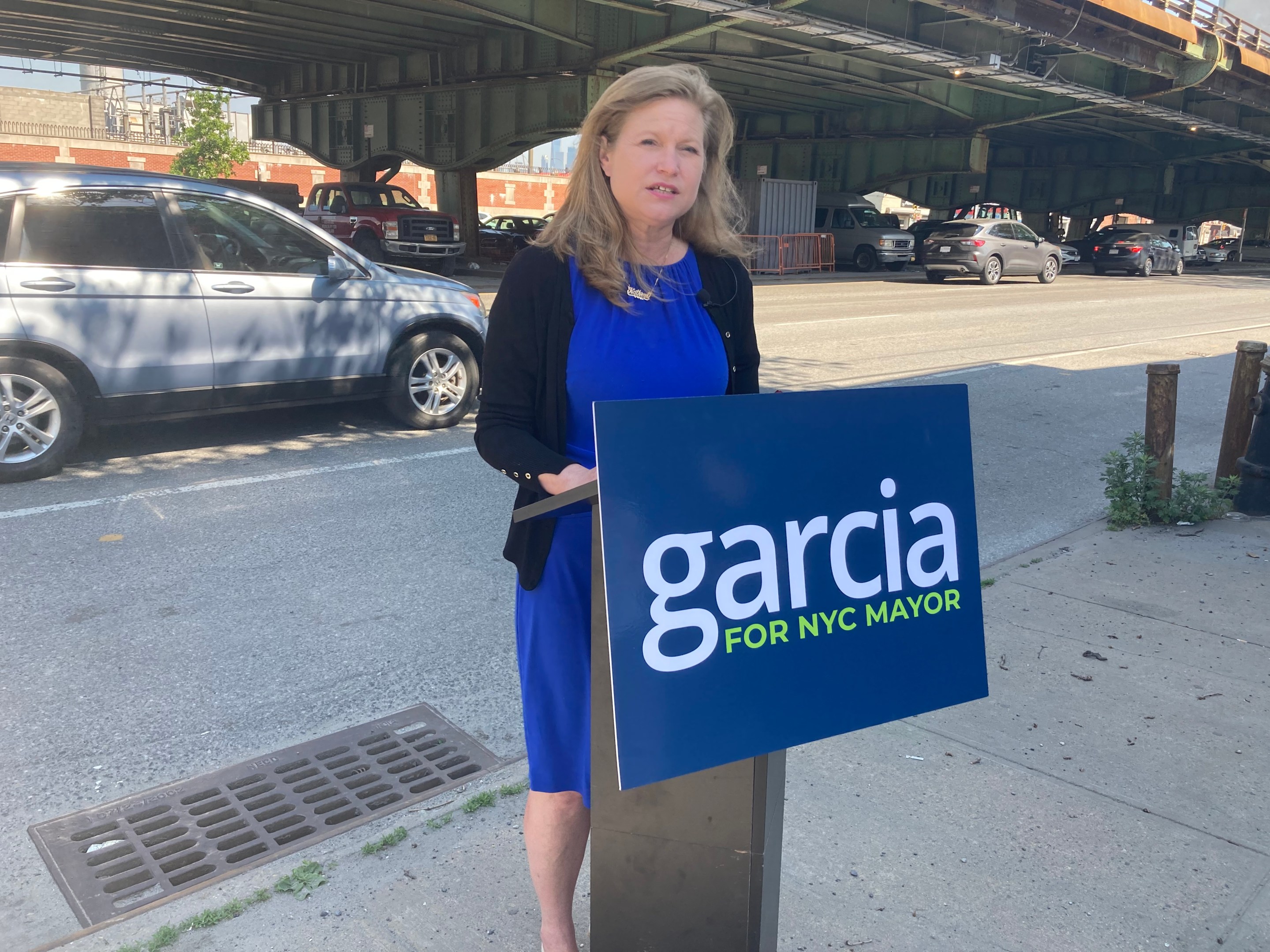Mayoral candidate Kathryn Garcia doubled down on her commitment to building out protected bike and pedestrian infrastructure Friday morning, standing along one of the deadliest corridors in Brooklyn, where at least six people have been killed since 2019 and pledging to carry out Transportation Alternatives' big ask of reclaiming at least a quarter of public roadway space that’s dedicated to private cars by 2025.
At the corner of Third Avenue and 24th Street, the New York Times-endorsed candidate said she would pick up where her would-be predecessor Mayor de Blasio has failed by, for example, prioritizing the enforcement of bike lane violations (on drivers, not cyclists), implementing daylighting at every one of the city’s 39,000 intersections, and expanding bike parking.
“This is clearly a crisis plain and simple. We don’t need any more plans, we need action and execution,” said Garcia. "Where de Blasio planned and pondered, I will execute; I will make our streets safer, the air cleaner, and save lives. Secure bike parking is critical and a scarcity. In the last eight years, the current mayor has failed to deliver on 11 separate plans to improve bike parking, including one to add 1,500 bike racks a year. Meanwhile, bike theft is up more than 27 percent. That’s why we need new leadership.”
When I spotted @KGforNYC hopping into her chauffeured van — which has two recent speeding tix — after telling me she took the R train to a press conference in Sunset Park, she said “I did but I have to go to something else now.” pic.twitter.com/N3PVUHbvI7
— Julianne Cuba (@Julcuba) May 21, 2021
Garcia has previously shared with Streetsblog her full transportation plan, which includes building 250 miles of protected bike lanes in four years (current law will require the next mayor to reach that same number in five years), and finally investing in Multihog machines to adequately clean the narrow bike paths that have often been left dirty and filled with snow long after storms.
“My administration will not only build new bike lanes, but ensure that bike lanes are regularly cleaned and maintained, come rain, sleet, or snow. We’ll do this by buying the badly needed small equipment to make this happen; yes I’m talking about my beloved multi hogs,” said Garcia, the former Sanitation Commissioner and participant int the “Dave Colon Challenge.”
Specifically asked about fixing Third Avenue — which is already a car-and-truck-sewer and is expected to become even worse thanks to an influx of last-mile distribution centers planned for the neighborhood and additional truck route designations — Garcia didn't offer specifics, but merely said it needs a major overhaul with things like daylighting, green space, and pedestrian and bike infrastructure. Garcia also tepidly supported applying a new DOT plan to repurpose similarly dangerous and ambiguous road space underneath a stretch of elevated tracts in the Bronx to Third Avenue.
"It's not only distribution enters, every time the BQE gets backed up, their alternate route is Third Avenue. This is where we need to re-invision how we're using this public space — have traffic-calming measures in place, it's not just about the trucks, but it's also making it an opportunity for bikes and pedestrians," said the candidate, who took the R train to the Sunset Park press conference, but then hopped in a chauffeured van after it. "We know that the built environment makes a huge different in pedestrian safety and cyclist safety. There seems to be an opportunity we have not taken here. It's about using all the tools."
Other aspects of Garcia’s transportation plan include instituting a residential parking permit program (which, studies show, may increase car ownership rather than decrease it); incentivizing micro-mobility options; giving DOT the power to make basic changes to the streetscape without having to get community board approval; and making protected bike lanes truly equitable by installing them in Black and brown communities.
But Garcia has also said she would maintain, not defund, the NYPD’s massive budget — a point of contention among many safe-street advocates who want to remove the NYPD from traffic enforcement, and see police not as a partner of Vision Zero, but as the antithesis of it — not least because cops treat the sidewalk as their own parking lots and because of their horrendous personal driving records.
A bill, Intro 2224-A, which makes the DOT, not the NYPD, the lead agency in investigating crashes, already passed the Council and became law in April.






